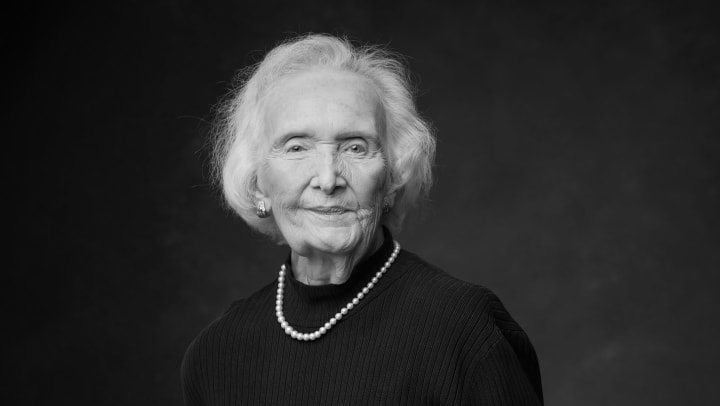In honor of Women's History Month, Touchmark embarks on a three-year initiative to identify and recognize exceptional female residents who defied the odds in their professional and personal lives to pursue opportunities that were historically off-limits for women. Please allow us to introduce Dorothy Smith, our final resident feature in this series.
Please tell us about your personal and professional background.
The reason I ended up in Mathematics and Biology was because both my husband, Sam, and I were going to go into medicine. Then World War II came along and he volunteered for the Air Force, so I went ahead with college and we skipped the plans for med school. I went to a small university in Oklahoma and got through while he was still in the Army, so I changed my major from premed to Science, Biology, and Physics.
When he came back, we got married and I worked for seven years while he was still in college getting his bachelor’s and doctorate degrees. That’s when I was teaching college football players after they came back from the war.
Then I had a job with the Naval Research Laboratory in Madison, Wisconsin. That’s where I did kind of unusual things. We didn’t have computers yet at that time, except a great big one in a room, and we had big calculators. We did the routine work for several atomic physicists. We worked on Ram Jets and Flame Theory. It was pretty wild.
It was like that movie Hidden Figures where the women did the calculating.
I also liked biology, astronomy, and physics, so I also had minors in those subjects, but mathematics was my main focus.
How did you manage getting through college in only three-and-a-half-years?
Well, I guess I have a basically good brain. I got straight A’s with no problem.
Did you face any obstacles pursuing your educational or career opportunities?
There weren’t too many women in the field, but the men didn’t hold it against me. I spoke up to them, which they must have respected. Take the football team, for example. They were all older than me and twice as big, and I didn’t feel discriminated against in any way, but I did feel I had to work harder to live up to the standards of what I was trying to do. I would do all of the homework I was giving them to be sure I had it right when I wrote it up on the board.
What advice would you give to women pursuing barrier-breaking careers today?
Just do your best and don’t feel inferior. I never felt inferior, and I tried to be humble.
What opportunities did you pursue when you weren’t working?
I was hooked up with the Friendship Force and went to countries like South Korea, Russia, Japan, China, the Amazon, Germany … all kinds of interesting places. You’d go anywhere in the world and you wouldn’t find out your assignment until a week before you left. I stayed in the homes of people and was an ambassador of an exchange program.
The mission was to try to create peace throughout the world.
I also used to drive for the American Cancer Society and a hospice group.
What kinds of things are you doing now?
Well, I’d like to learn American Sign Language, speaking of the Friendship Force. I’ve been a lifelong learner; I like to learn new things. I also take classes taught by retired college professors that I get on DVD.
I’ve ended up taking a lot of the medical classes I was never able to earlier.
I’ve now taken anatomy and physiology, all kinds of classes, and when my friends want to know what their symptoms are, I have all these research books and I try to explain to them what their diagnoses mean. I don’t go around volunteering the information, but I try to help people when they ask about it.
Outside of your family, what are the accomplishments in your life of which you are most proud?
I had cancer and I was in the hospital for three months at a time because of complications. I lost a daughter when she was 30, and without my faith, I would have had a hard time facing those situations. My faith comes first, then my family, then my friends.
I have a lot of good, long-term friends, some even from grade school and some from when we lived in New York. We have a round-robin letter we use to still keep in touch. All of that should really come before work.
I’ve been to all seven continents, and to Antarctica, and on several safaris to Africa. I’ve been to all 50 states and all the provinces in Canada. Antarctica is the most interesting. Lots of icebergs and penguins and whales. No people, no hotels or restaurants. You do everything from the boat and visit the research stations.
Do you have any final thoughts as we wrap up?
I feel very fortunate. I enjoyed everything I did. And I am still finding new things to enjoy.
Thank you to Dorothy for sharing her story with us. Next year, we will feature four more extraordinary women from Touchmark communities.

